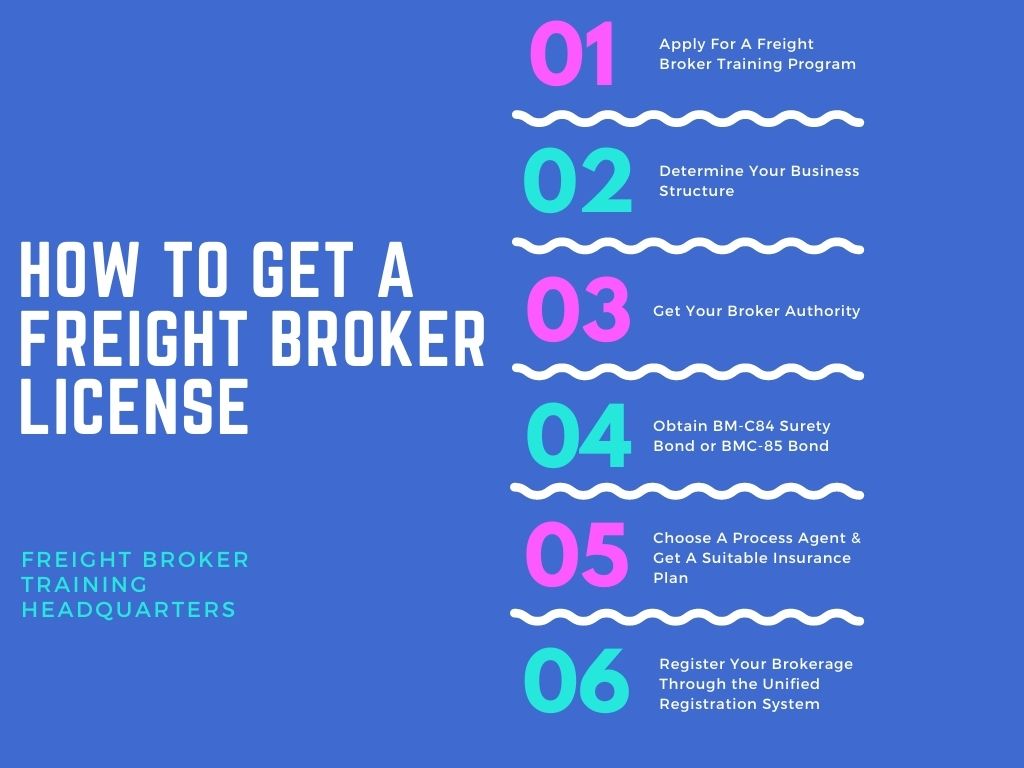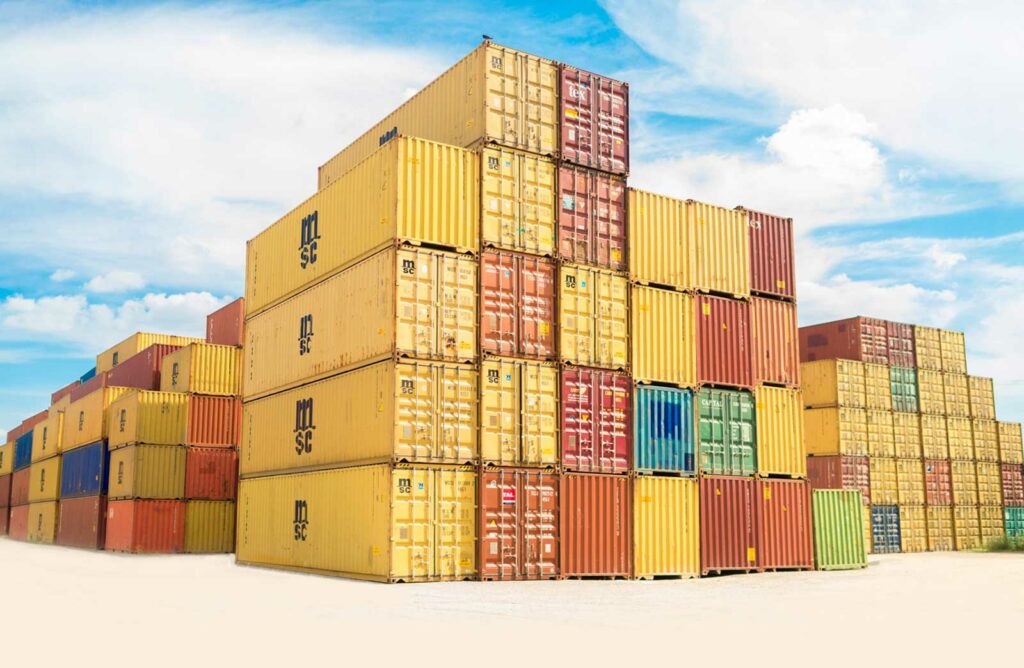Want to get into the freight broker business, or take that next step to opening your own freight brokerage?
There has never been a better time to start a new career path in the transportation industry as a freight broker.
The prospects look great, and you’re just in time to enjoy some of the professional and financial rewards but first, you’ll have to obtain your freight broker license from the Federal Motor Carrier Safety Administration (FMCSA) broker authority.
How do you get a freight broker license?
To officially get licensed as a freight broker, you’ll need to undergo professional training, set up a business structure, source freight carriers, get a surety bond or trust bond, obtain liability insurance, and most importantly, secure a broker permit from the FMCSA.
Let’s talk about each of these steps in detail.
How Do You Get A Freight Broker License?
It’s understandable that some might be overwhelmed by the number of steps and the seemingly rigorous process and requirements.
But that’s not even really a problem.
Rather it’s the lack of adequate information on what to do and how to do it that deters many from pursuing a career as a freight broker.
What’s the best freight broker training program to apply for?
How much will it cost to get a freight broker license?
How to apply for broker authority?
You might also be wondering what to do after your license is granted?
All these questions about the freight industry and many more will be answered in this article.
Apply For A Freight Broker Training Program
As in any other endeavor, before you get started as a freight broker, you’ll need to learn the ropes from seasoned professionals.
There are a few different ways to get the training you need to have to get the job done.
First off, you can work your way in with a freight broker company like C.H. Robinson, Landstar, Schneider Logistics, or any of the other big names out there and become a freight broker agent.
A freight agent is someone who works on behalf of the licensed freight broker to help manage the responsibilities of the job.
This way, you can get your foot in the door, and learn the business in a real world situation.
You can also go through a freight broker training course. There are a variety of different freight broker training schools, from independent schools run by brokers in the industry to colleges and universities like the programs at the University of West Florida and Auburn University at Montgomery.
Getting formal training is a fantastic way to kickstart your career as in the freight brokerage business, but getting real world experience is what will make you most valuable.
You can even go the self-study route too. You can take online courses, read books, or watch videos on YouTube made by specialists. Volunteering at a freight brokerage firm around you can help you learn the basics and develop your skills.
Determine Your Business Structure
If you’re looking to get your freight broker’s license, odds are you’re looking to start your own independent firm.
So before you launch yourself into the industry properly, you’ll need to choose the business structure that you’ll like to operate.
As a freight broker, you can operate as :
- Limited Liability Company
- Sole Proprietorship
- Partnership
- Corporation
Your business structure will most likely have long-term implications on your business and the regulatory requirements.
So, if you’re not sure which one of these is going to be the right fit, or you’re having trouble deciding on your own, get professional advice from a business attorney or tax expert.
Once you’ve decided on your business model, draft a detailed business plan so you know what kind of business you’re going to run, what processes and systems you’ll need to have, and what your operational plans are for building a successful business.
Get Your Broker Authority
There are two types of broker authority that you’ll be applying for:
- Broker of Household Goods
- Broker of Property (except Household Goods)
- Or both
There’s no restriction on one vs. another, so if you want broker authority for both, then the only thing different are the costs.
The cost is $300 for each category, so if you decided to do both, your processing fee would be $600, and it will take 4-6 weeks.
There are also two different processes for applying for authority:
If you’re a new applicant looking to get broker authority from FMCSA for the first time, you must apply through the Unified Registration System.
However, if you’re applying for additional authority, you’ll only have to complete Form OP-1.
Let’s discuss both processes.
Applying Through the Unified Registration System
As a first time applicant, you’ll need to visit FMCSA’s registration page, provide your company’s details to get your Motor Carrier (MC) Number, then follow the steps below:
- Get the required proof of insurance coverage
- Complete and submit Form BOC-3
- Pay a non-refundable processing fee of $300 per category
- Wait for your application to be processed (this would usually take between four to six weeks)
Note: You’ll be required to revise and update your information every two years, this process is free.
In the instance that there is someone who finds a problem with your registration, they can protest it within 10 days of the MC number being assigned.
After this time has passed with no objections, you’ll be granted MC authority, giving you the green signal to start your brokerage.
Applying Through Form OP-1
If you’re an existing broker seeking to update your current authorities or apply for new ones, it’s a lot easier.
All you need to do is visit FMSCA’s website to download Form OP-1 or call 800-832-5660 to have it mailed to you. Print and complete the form, and mail it back to the address on the form.
Obtain BM-C84 Surety Bond or BMC-85 Bond
Getting a BM-C84 or BMC-85 bond is a mandatory obligation that you must fulfill before you are granted a broker authority.
On the surface, it sounds like a difficult process but in reality, it’s nothing more than a contractual pact between yourself, the FMCSA, and the surety.
To further mitigate the risks involved, the required bond amount was reviewed and raised from $10,000 to $75,000 in 2013 after the Moving Ahead for Progress in the 21st Century Act (MAP-21) was passed.
Keep in mind you don’t have to raise this money – $75,000 – yourself. Not many of us have that kind of money laying around!
Your bond premium will range between 2-4 percent of the $75,000 fee, depending on your credit score and the type of bond you’re required to carry and which company you choose.
You can work with a surety bond company and pay a percentage of the bond amount to them on your behalf.
What this basically means is this:
The surety bond is a financial agreement between the surety company, you as the freight broker, and the person or organization that’s requiring the bond, like the FMSCA, that guarantees that the one for whom they’re providing the bond, will act in accordance with an agreed set of terms that guarantees compliance, performance or a payment to be made of some kind.
This is kind of like insurance and is one of those things that you hope you never have to use. But in the instance that you do need to rely on it, it grants a veil of protection and the surety company will step in and pay the claim so long as it’s within the limit.
Choose A Process Agent
Speaking of those things you hope you never have to use, one of the things you’ll need to have is a process agent that is active in all the states in which you operate.
A freight broker must appoint a process agent in every state in which they have an office and they write contracts and this is mandated at the Federal level to be in compliance with 49 CFR 366.
The job of a process agent is to serve as a legal representative of you and your business.
They represent you in those states and are able to receive all legal documents on your behalf.
You can either choose to hire different process agents for different states or employ the services of a national process agent to represent you across all 50 states.
Whichever option you choose, you will need to communicate it to the FMCSA by completing and submitting the BOC-3 form.
Get A Good Insurance Plan
Making sure your business is protected is a vital step in the process of becoming a freight broker.
It depends on how you set up your business (whether you’re an LLC or a corporation, etc.), but making sure you’re set up for success with your business license for your city, county and state are crucial.
And so is getting the right kind of business insurance in place.
It’s a good idea to get a freight brokerage insurance plan that will protect you from the potential risks involved in transporting loads such as freight damage, property damage, and injuries caused by errors on the part of your carriers, and other business mishaps.
As a matter of fact, all freight forwarders and carriers are required by the FMCSA to have liability insurance. This is one of the compulsory requirements by the FMCSA, but you might not necessarily need it as a broker.
If you chose to forego business insurance for yourself, make sure that your carriers have the right insurance plan before you enter into agreements with them.
Register Your Brokerage Through the Unified Registration System
Finally, you’ve got all you need to become a freight broker, but before you start sending out proposals and working as a broker to find shippers, you need to officially register with the FMCSA through the Unified Carrier System (URS), and pay an application fee of $76.
This URS is a user-friendly platform that incorporates all the forms you require to complete your registrations. When you’ve completed your registration, the next thing to do is to get familiar with the laws that guide freight movement in your locality.
How Much Does It Cost To Get A Brokerage License?
When it comes to the costs associated with getting your brokerage license, you have to think about all the various parts of the application process together.
That means figuring out what training you need, and how much your surety bond and business insurance are going to cost you.
Keep in mind, your bond premium is determined by your credit score.
These things are all variable costs.
That means they can and will vary from one provider to another and depend on the state you live in and whether or not there are any state-specific costs that you need to be aware of.
Then you have to factor in the $300 license fee (per category) for your broker authority. The fee for this is fixed.
What To Do When Your License is Granted
Once your license has been approved, scout and select good carriers, then sourcing for shippers.
If you’ve got industry experience you’ll likely already have some great contacts and will be able to hit the ground running.
But getting new business into your new business is an ever-present requirement!
This is not an easy task, particularly considering that you’re just starting out. Thankfully, we’ve prepared a list of 11+ proven methods that will help you find shippers with ease.





